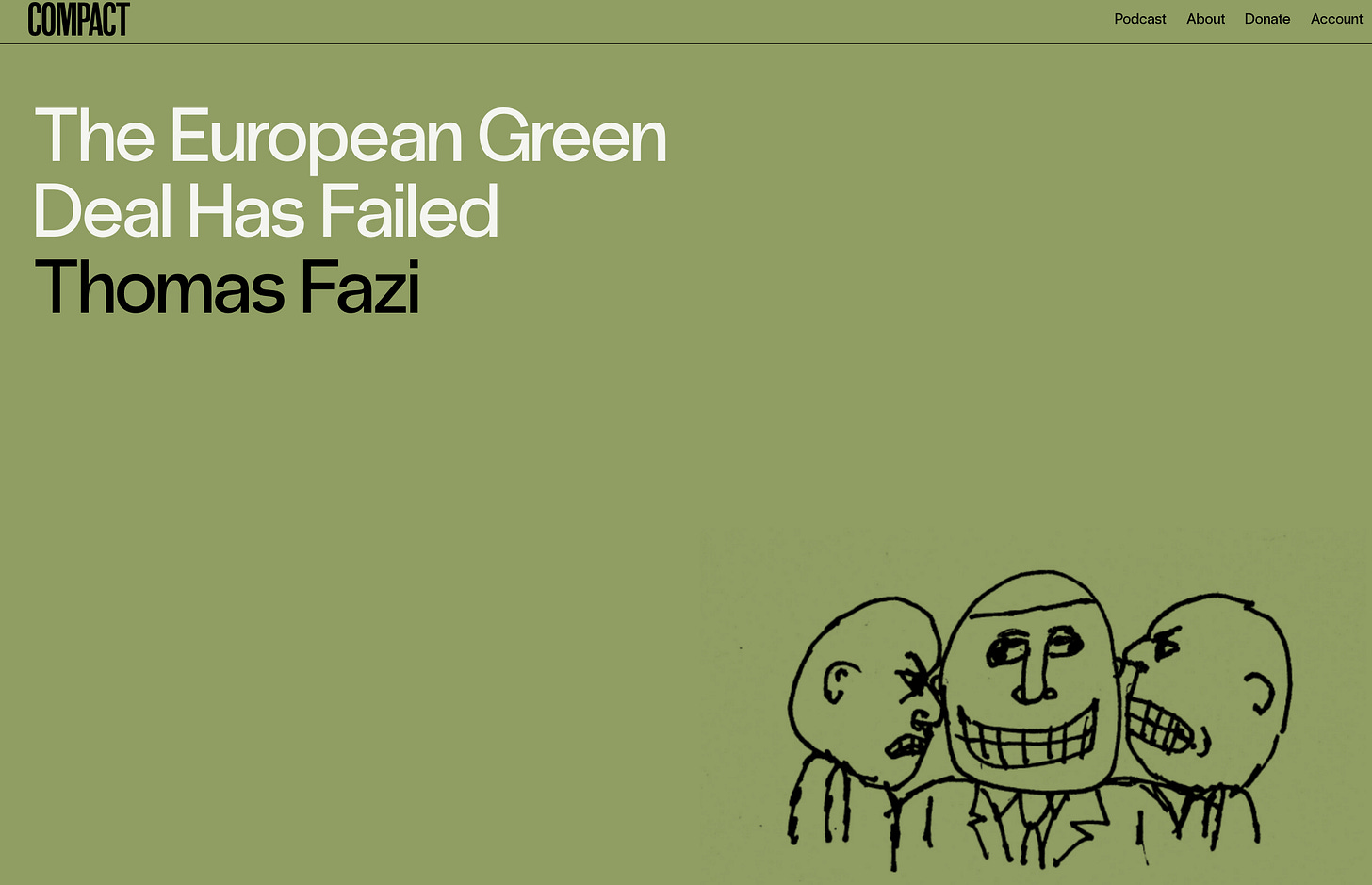The European Green Deal has failed
The anti-democratic, technocratic, fiscally restrictive and ideologically captured nature of the European Union make it structurally unable to implement a sensible and socially just green transition
I’ve written for Compact about the failure of the European Green Deal, and why it is rooted in the anti-democratic, technocratic, fiscally restrictive and ideologically captured nature of the European Union itself:
The mainstream narrative blames “far-right climate denialists” and corporate lobbyists for derailing the Green Deal, this explanation is simplistic and evasive. The deeper reality is that the Green Deal has failed on its own terms—economically, ecologically, and politically.
Despite massive spending—$680 billion allocated between 2021 and 2027, or more than a third of the European Union’s total budget—the Green Deal has delivered negligible climate results. EU emissions rose in the last quarter of 2024 compared to 2023, and the longer-term reductions over the past 15 years largely reflect economic stagnation, pandemic lockdowns, and the economic shock from the war in Ukraine—not the fruits of green policy.
At the same time, the social and economic fallout has been severe. Households, farmers, and businesses have borne the brunt of higher energy prices, inflation, new taxes, and regulatory burdens. These policies may have suited Brussels technocrats and environmental NGOs, but they have alienated the wider population and damaged the Union’s legitimacy.
The root of the problem lies in the approach the bloc has taken. While the United States and China have been pursuing green industrial policy through massive subsidies, public investment, and targeted research and development in strategic sectors like electric vehicles, solar panels, and batteries, the European Union’s model is based on punitive taxation and regulatory overreach. This strategy was always doomed.
[…]
Perhaps the most revealing episode in this story is the European Union’s energy policy after Russia’s invasion of Ukraine. Having chosen to decouple from cheap Russian gas as part of its embrace of the NATO proxy war in Ukraine, Europe turned to liquefied natural gas (LNG) shipped from the United States and Qatar—fuel that is not only more expensive, but also dramatically more polluting due to transport emissions. Thus, in one stroke, the European Union’s managed to undermine its own industry, raise costs for consumers, and increase global carbon emissions. It’s a perfect example of how ideology and geopolitics can combine to produce disastrous outcomes.
Read the article here.
Putting out high-quality journalism requires constant research, most of which goes unpaid, so if you appreciate my writing please consider upgrading to a paid subscription if you haven’t already. Aside from a fuzzy feeling inside of you, you’ll get access to exclusive articles and commentary.
Thomas Fazi
Website: thomasfazi.net
Twitter: @battleforeurope
Latest book: The Covid Consensus: The Global Assault on Democracy and the Poor—A Critique from the Left (co-authored with Toby Green




In more abstract terms, shouldn't we face up to a simple, but harsh truth. That the politicians of our age, almost without exception, don't give a shit about the well being of the next generation, nor the ones after that. They're current lot are too busy looking after their wallets. The same will be true for all subsequent generations unless and until the ideological mask drops and the state rightly assumes that duty of care. It's socialism or barbarism.
Green plans generally defy things like physics and are a trough for rentier capitalists. Good riddance.